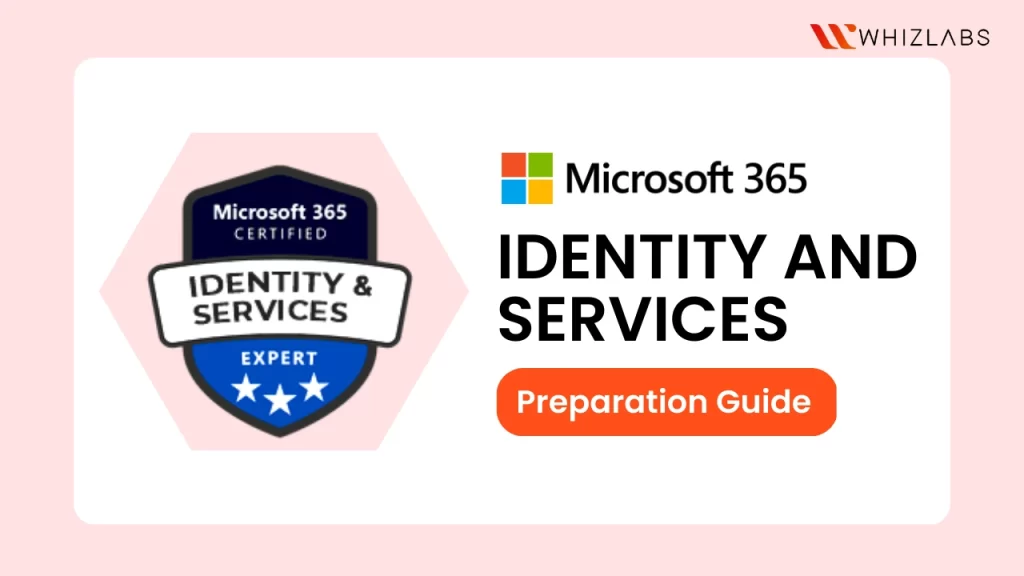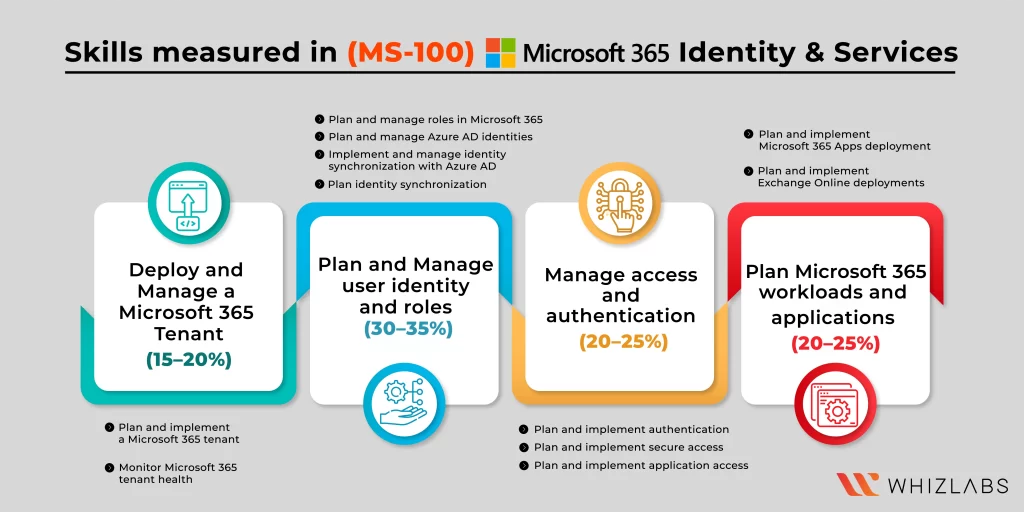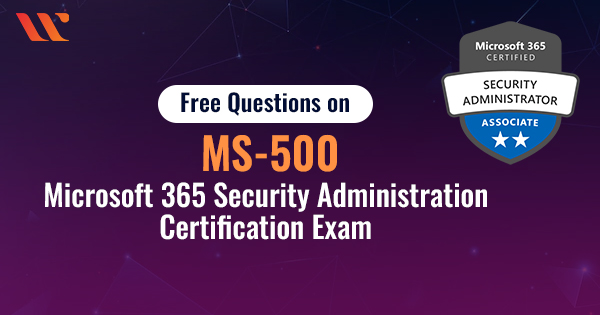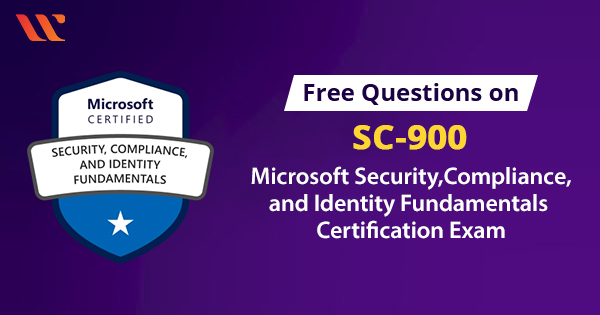Looking to become certified as a Microsoft 365 Enterprise Administrator? If it is yes, then take the MS-100 certification without any hesitation.
MS-100: Microsoft 365 Identity and Services certification exam validates your skills in managing user identities and access, implementing and managing security and compliance.
In this blog post, we’ll provide you with everything you need to know about the MS-100 exam, including what to expect, tips for preparation, and resources to help you succeed.
Latest updates: MS 100 certification is retired on September 30, 2023. A replacement exam, the MS-102: Microsoft 365 Administrator(beta), is available.
About MS-100: Microsoft 365 Identity and Services certification exam
MS-100: Microsoft 365 Identity and Services certification exam is ideal for Microsoft 365 Enterprise Administrators who want to acquire skills such as evaluating, planning, migrating, deploying, and managing Microsoft 365 services. They collaborate with the architects and workload administrators.
The roles and responsibilities of Microsoft 365 Enterprise Administrators such as:
- Carry out various Microsoft 365 tenant management tasks for an enterprise, such as identities, security, compliance, and supporting technologies
- Engaged in Microsoft 365 tenant-level planning, implementation, and administration of cloud and hybrid enterprise environments
In order to become a Microsoft 365 Certified: Enterprise Administrator Expert, one has to qualify for two exams such as:
- Microsoft 365 Identity and Services (MS-100)
- Microsoft 365 Mobility and Security (MS-101)
Also Read: Microsoft 365 Certification Path – Updated [New]
What are the skills you will gain from the MS-100 exam?
Individuals seeking proficiency in the management of Microsoft 365 Identity and Services can endeavor to acquire the MS-100: Microsoft 365 Identity and Services certification. And skills that are needed to clear MS-100: Microsoft 365 Identity and Services exam such as:
- Deploy and manage a Microsoft 365 tenant (15–20%): It envelops topics such as deploying and managing Microsoft 365 tenants, including managing subscriptions, configuring tenant settings, and managing tenant health and services.
- Plan and manage user identity and roles (30–35%): It includes managing user identities, roles, and groups in Microsoft 365 environments, including configuring and managing user accounts, groups, and Azure AD Connect.
- Manage access and authentication (20–25%): It might cover the topics on managing access and authentication solutions in Microsoft 365 environments, including implementing and managing multi-factor authentication (MFA), conditional access policies, and Azure AD Identity Protection.
- Plan Microsoft 365 workloads and applications (20–25%): This topic covers planning and managing Microsoft 365 workloads and applications, including Exchange Online, SharePoint Online, Teams, and Power Platform.
Who should take the MS-100 exam?
MS-100: Microsoft 365 Identity and Services Certification exam is intended mainly for IT professionals who are responsible for managing Microsoft 365 services such as identities, roles, and requirements for aiding Microsoft 365.
The primary audience for the MS-100 exam includes IT professionals who have experience with Microsoft 365 services, including:
- IT administrators: The professionals who are responsible for managing Microsoft 365 environments, including identity and access management, user and group management, and device management can take up this certification.
- Messaging administrators: Professionals who are involved in the management of messaging infrastructure, such as Exchange Server, and want to transition to Microsoft 365 can attempt this exam.
- Security administrators: Professionals who are responsible for managing security and compliance solutions in Microsoft 365.
- SharePoint administrators: Professionals who manage SharePoint infrastructure and want to transition to Microsoft 365.
- Network administrators: Professionals who are responsible for managing a network infrastructure and want to learn how to integrate Microsoft 365 into their network.
- Cloud administrators: Professionals who are responsible for managing cloud infrastructure and want to learn how to manage Microsoft 365 services.
What are the prerequisites required for MS-100 Certification exam?
In order to become eligible for taking MS-100: Microsoft 365 Identity and Services Certification exam, the candidate needs to have the following skills:
- Individuals who are eligible to take this exam should possess practical expertise in managing Microsoft 365 workloads and Microsoft Azure Active Directory, which are components of Microsoft Enterprise.
- They should have administered at least one of these technologies and have a sound understanding of networking, server administration, DNS, and PowerShell.
What are the benefits of obtaining MS-100 Certification?
MS-100: Microsoft 365 Identity and Services Certification can bring many benefits to professionals those who are working with Microsoft 365, including increased career opportunities, improved job performance, and recognition from Microsoft.
Here are some potential benefits of taking MS-100: Microsoft 365 Identity and Services Certification:
- Increased career opportunities: MS-100: Microsoft 365 Identity and Services Certification can open up new career opportunities in IT administration, specifically for those interested in managing Microsoft 365 environments.
- Career credibility: This Certification validates the professional’s skills in implementing and managing Microsoft 365 identity and services solutions, and it certainly increases their credibility among colleagues and employers.
Exam domain for MS-100: Microsoft 365 Identity and Services certification exam
Deploy and manage a Microsoft 365 tenant (15–20%)
- Plan and implement a Microsoft 365 tenant
- Monitor Microsoft 365 tenant health
Plan and manage user identity and roles (30–35%)
- Plan identity synchronization
- Implement and manage identity synchronization with Azure AD
- Plan and manage Azure AD identities
- Plan and manage roles in Microsoft 365
Manage access and authentication (20–25%)
- Plan and implement authentication
- Plan and implement secure access
- Plan and implement application access
Plan Microsoft 365 workloads and applications (20–25%)
- Plan and implement Microsoft 365 Apps deployment
- Plan and implement Exchange Online deployments
- Plan and implement Microsoft SharePoint Online, OneDrive, and Microsoft Teams
Study materials to refer for MS-100 certification exam
When you begin to prepare for an examination, you often find yourself facing two crucial questions: which topics should we focus on, and where we can find trustworthy information?
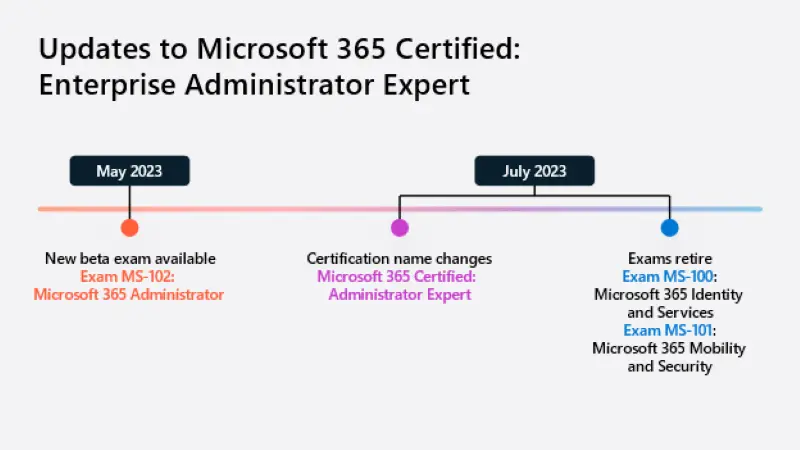
Our objective is to offer learning resources that will enable you to pass the certification exam on your first attempt. If you follow the provided learning materials, we guarantee that you will achieve MS-100: Microsoft 365 Identity and Services certification exam.
- Microsoft Learning Paths: Microsoft offers official learning paths that cover the skills and knowledge required for the exam. These learning paths provide a comprehensive understanding of the exam objectives and include video lectures, hands-on labs, and practice exercises.
- Microsoft Documentation: Microsoft has comprehensive documentation on Microsoft 365 identity and services that cover all the topics related to the exam. You can refer to the official Microsoft documentation to understand the concepts and features of Microsoft 365.
- Microsoft 365 Certifications Exam Study Groups: Microsoft offers a certification community where you can connect with other candidates, ask questions, and get advice on preparing for the exam.
- Practice Tests: Practice tests help you assess your knowledge and skills and identify areas where you need to improve. You can find a variety of practice tests online that are designed to simulate the exam.
- Books: Books are great learning resources. Microsoft Press itself has published a book called “Exam Ref MS-100 Microsoft 365 Identity and Services by Orin Thomas“. This book can be used as a study guide to prepare for the exam.
- Instructor-Led Training: Microsoft offers instructor-led training that provides hands-on experience and in-depth knowledge of the exam objectives. You can enroll in these training programs to get a better understanding of the concepts and features of Microsoft 365 identity and services.
- Online Courses: You can also find various online courses on platforms like Whizlabs, Coursera, Udemy, and LinkedIn Learning.
Preparation tips for the MS-100: Microsoft 365 Identity and Services certification exam
Preparing for the MS-100: Microsoft 365 Identity and Services certification exam can seem daunting, but with the right approach, you can improve your chances of success. Here are some tips to help you prepare for the exam:
- Familiarize yourself with the exam objectives: The first step to preparing for any certification exam is to understand the exam objectives. This will help you identify the topics that you need to focus on and ensure that you have a comprehensive understanding of the content.
- Use Microsoft documentation and online resources: Microsoft provides a wealth of documentation and resources that can help you prepare for the exam. Take advantage of these resources, including the Microsoft 365 documentation, Microsoft Learn, and the Microsoft 365 certification community.
- Practice with hands-on experience: It’s essential to have hands-on experience with Microsoft 365 to succeed in the exam. Consider setting up a Microsoft 365 tenant, and practicing the skills you need for the exam in a live environment.
- Join a study group or find a study partner: Studying with a group or partner can be an effective way to prepare for the exam. You can share knowledge, ask questions, and keep each other motivated.
- Take practice exams: Practice exams are an excellent way to evaluate your knowledge and identify areas where you need more work. You can find many practice exams online, including official Microsoft practice exams.
By following these tips, you can approach the MS-100 exam with confidence and ace the exam in the first try itself.
Sample Practice Questions for MS-100: Microsoft 365 Identity and Services certification exam
Domain: Plan and manage user identity and roles (30–35%)
Question 1:
Whizlab is practicing the least privilege. Based on the tasks given in Table 1,
What admin roles can we assign to groups?
Choose the correct answer.
- IT Group1: License Admin IT Group2: Global Admin
- IT Group3: Billing Admin IT Group1: License Admin
- IT Group1: User Admin IT Group3: Billing Admin
- IT Group1: Helpdesk Admin IT Group4: Global Admin
Answer: A
Explanation:
| Admin role | Actions can perform? |
|---|---|
| Billing admin | Billing admin role is for the people who make purchases, manage subscriptions and service requests, and monitor service health.
Billing admins can manage all aspects of billing, Create and manage support tickets in the Azure portal. |
| Global admin | With Global admin role we can do most management features like – Reset passwords for all users – Add and manage domains – Unblock another global admin The person who signed up for Microsoft online services automatically becomes a Global admin. |
| License admin | License admin role is for the users who need to assign and remove licenses from users and edit their usage location.
|
| User Admin | User admin role can perform the following actions. – Add users and groups – Assign licenses – Manage most users properties – Update password expiration policies – Manage service requests |
Reference:
About admin roles in the Microsoft 365 admin center – Microsoft 365 admin | Microsoft Learn
Domain: Plan and manage user identity and roles (30–35%)
Question 2:
Whizlabs is planning to create dynamic groups based on the department name.
You need to create a dynamic query that creates members for the HR department.
Which query should you use?
- department eq ‘HR’
- user.department -eq “HR”
- user.department = ‘HR’
- $department == “HR”
Answer: B
Explanation:
Option A is incorrect
department eq ‘IT’
You must specify user.department to represent a user department. You must specify -eq as the equality operator.
Option B is correct
user.department -eq “IT”
The user.department variable specifies the department attribute of the current user that is being synchronized. The -eq operator specifies the equality comparison operator. The “IT” value indicates that the user.department variable must be set to IT, so the user can be added to the IT group. You can create a dynamic query by accessing a group’s properties in Azure AD. Every Microsoft 365 subscription is associated with a corresponding Azure AD tenant.
Option C is incorrect
user.department = ‘HR’
the = operator does not correctly specify the equality comparison operator.
Option D is incorrect
$department == “IT”
The $department token does not correctly specify the variable that represents a user’s department, and the == operator does not correctly specify the equality comparison operator to define dynamic queries.
Reference:
Rules for dynamically populated groups membership – Azure AD – Microsoft Entra | Microsoft Learn
Domain: Plan and manage user identity and roles (30–35%)
Question 3:
What is the best and suitable option which satisfies the 2nd technical requirement along with Quick failover and fault tolerance with minimal infrastructure?
- Deploy one active Azure AD Connect server and one Azure AD Connect server in staging mode.
- Deploy two active Azure AD Connect servers and two Azure AD Connect servers in staging mode.
- Deploy one active Azure AD Connect server and two Azure AD Connect servers in staging mode.
- Deploy two active Azure AD Connect servers and one Azure AD Connect server in staging mode.
Answer: A
Explanation:
You should deploy one active Azure AD Connect server and one Azure AD Connect server in staging mode. You can have only one active Azure AD Connect server for a single Azure AD tenant.
You can choose to install a second Azure AD Connect server in staging mode so that it collects information but does not send it to Azure AD. If the primary Connect server fails, you can make the staged mode server active.
There should only be one active sync server at any given time to serve as an authority on the data that is synced from on-prem to the cloud. Having multiple active sync servers can lead to unexpected attribute values or duplicate identities in Azure AD.
However we can have multiple staging servers but having multiple staging servers won’t add any value to the organization in real time.
Reference:
Azure AD Connect: Supported topologies – Microsoft Entra | Microsoft Learn
FAQs
Q: Is MS-100 exam worth it?
A: If you’re not at a point in your career where you’re unlikely to be given a Microsoft 365 administrator position, the certification can be beneficial. IT professionals who are interested in this certification may find it advantageous, as it is a valuable qualification for Microsoft 365 Certified: Enterprise Administrator Expert.
A: The difficulty level of studying for the MS-100 exam may vary depending on your level of experience and familiarity with Microsoft 365. However, it is generally considered to be an intermediate-level exam, and it covers a range of topics related to configuring, deploying, and managing Microsoft 365 services and features.
If you have prior experience working with Microsoft 365, you may find it easier to understand the concepts and pass the exam. However, if you are new to Microsoft 365, it may require more effort and time to study and prepare for the exam.
Q: What is the MS-100 exam?
A: The MS-100 exam is a Microsoft certification exam that focuses on evaluating the knowledge and skills of IT professionals related to Microsoft 365 identity and services.
A: The time it takes to study for the MS-100 exam may vary depending on your level of experience and familiarity with Microsoft 365. If you have prior experience working with Microsoft 365, you may need less time to study and prepare for the exam. On the other hand, if you are new to Microsoft 365, it may require more time to understand the concepts and features covered in the exam.
Generally, Microsoft recommends dedicating at least 8-12 weeks to study for the MS-100 exam. This includes attending training courses, reviewing exam guides, and practicing with hands-on labs and practice tests. It is important to create a study plan and allocate sufficient time each week to ensure you cover all the exam topics thoroughly. You can adjust your study timeline based on your schedule and pace of learning.
Summary
Hope this MS-100 certification article provides you with the essentials while preparing for the MS-100: Microsoft 365 Identity and Services certification exam. Staying updated can bring success in their career and it is attained by utilizing a platform that is reliable and authentic.
By considering this, Whizlabs came up with learning materials like practice tests and familiarized yourself with attain objectives of the MS-100: Microsoft 365 Identity and Services certification exam.
- 7 Pro Tips for Managing and Reducing Datadog Costs - June 24, 2024
- Become an NVIDIA Certified Associate in Generative AI and LLMs - June 12, 2024
- What is Azure Data Factory? - June 5, 2024
- An Introduction to Databricks Apache Spark - May 24, 2024
- What is Microsoft Fabric? - May 16, 2024
- Which Kubernetes Certification is Right for You? - April 10, 2024
- Top 5 Topics to Prepare for the CKA Certification Exam - April 8, 2024
- 7 Databricks Certifications: Which One Should I Choose? - April 8, 2024
